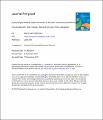| dc.contributor.author | Puolakanaho, Anne | |
| dc.contributor.author | Tolvanen, Asko | |
| dc.contributor.author | Kinnunen, Sanna M. | |
| dc.contributor.author | Lappalainen, Raimo | |
| dc.date.accessioned | 2019-12-16T14:01:16Z | |
| dc.date.available | 2019-12-16T14:01:16Z | |
| dc.date.issued | 2020 | |
| dc.identifier.citation | Puolakanaho, A., Tolvanen, A., Kinnunen, S. M., & Lappalainen, R. (2020). A psychological flexibility -based intervention for burnout : A randomized controlled trial. <i>Journal of Contextual Behavioral Science</i>, <i>15</i>, 52-67. <a href="https://doi.org/10.1016/j.jcbs.2019.11.007" target="_blank">https://doi.org/10.1016/j.jcbs.2019.11.007</a> | |
| dc.identifier.other | CONVID_33596690 | |
| dc.identifier.uri | https://jyx.jyu.fi/handle/123456789/66857 | |
| dc.description.abstract | A novel eight-week program based on Acceptance and Commitment Therapy (ACT) principles was created to alleviate burnout-related ill-being and to enhance well-being. This randomized controlled trial investigated the effectiveness of the program and explored whether changes in psychological flexibility mediated the results of the intervention. The program consisted of structured weekly face-to-face group meetings and daily practices provided via a website. Employees from varying professional backgrounds with burnout (mean age = 47 years, 79% female), who all received usual treatment, 1 were randomized into control (TAU, n = 80, receiving no other support) and ACT + TAU intervention (n = 88, receiving additional ACT support) groups. The ACT + TAU group outperformed the TAU group in all 14 scales used, indicating that burnout-related ill-being at work (between-group Cohen's d = 0.36–0.76) and psychological symptoms (d = 0.27–0.61) decreased and general well-being (d = 0.14–0.38) and psychological flexibility skills (d = 0.29–0.64) increased during the intervention. These gains were maintained during the one-year follow-up period. The changes in the psychological flexibility -factor mediated almost completely the changes in the outcome factors of burnout, well-being, and psychological symptoms. The study suggests that psychological flexibility skills can be crucial elements in job-related burnout interventions and that combined group and web-based interventions may offer an efficient treatment method. | en |
| dc.format.mimetype | application/pdf | |
| dc.language | eng | |
| dc.language.iso | eng | |
| dc.publisher | Elsevier BV | |
| dc.relation.ispartofseries | Journal of Contextual Behavioral Science | |
| dc.rights | CC BY-NC-ND 4.0 | |
| dc.subject.other | acceptance and commitment therapy (ACT) | |
| dc.subject.other | mindfulness-based stress reduction (MBSR) | |
| dc.subject.other | psychological flexibility | |
| dc.subject.other | burnout | |
| dc.subject.other | stress | |
| dc.subject.other | well-being | |
| dc.subject.other | psychological symptoms | |
| dc.title | A psychological flexibility -based intervention for burnout : A randomized controlled trial | |
| dc.type | article | |
| dc.identifier.urn | URN:NBN:fi:jyu-201912165350 | |
| dc.contributor.laitos | Psykologian laitos | fi |
| dc.contributor.laitos | Department of Psychology | en |
| dc.contributor.oppiaine | Psykologia | fi |
| dc.contributor.oppiaine | Psychology | en |
| dc.type.uri | http://purl.org/eprint/type/JournalArticle | |
| dc.type.coar | http://purl.org/coar/resource_type/c_2df8fbb1 | |
| dc.description.reviewstatus | peerReviewed | |
| dc.format.pagerange | 52-67 | |
| dc.relation.issn | 2212-1447 | |
| dc.relation.volume | 15 | |
| dc.type.version | acceptedVersion | |
| dc.rights.copyright | © 2020 Elsevier BV | |
| dc.rights.accesslevel | openAccess | fi |
| dc.subject.yso | tietoinen läsnäolo | |
| dc.subject.yso | hyväksymis- ja omistautumisterapia | |
| dc.subject.yso | uupumus | |
| dc.subject.yso | stressi | |
| dc.format.content | fulltext | |
| jyx.subject.uri | http://www.yso.fi/onto/yso/p24919 | |
| jyx.subject.uri | http://www.yso.fi/onto/yso/p20112 | |
| jyx.subject.uri | http://www.yso.fi/onto/yso/p130 | |
| jyx.subject.uri | http://www.yso.fi/onto/yso/p133 | |
| dc.rights.url | https://creativecommons.org/licenses/by-nc-nd/4.0/ | |
| dc.relation.doi | 10.1016/j.jcbs.2019.11.007 | |
| jyx.fundinginformation | The study was funded by the Social Insurance Institution of Finland (Dnro33/331/2012) and supported and conducted in the University of Jyväskylä, Finland. | |
| dc.type.okm | A1 | |

